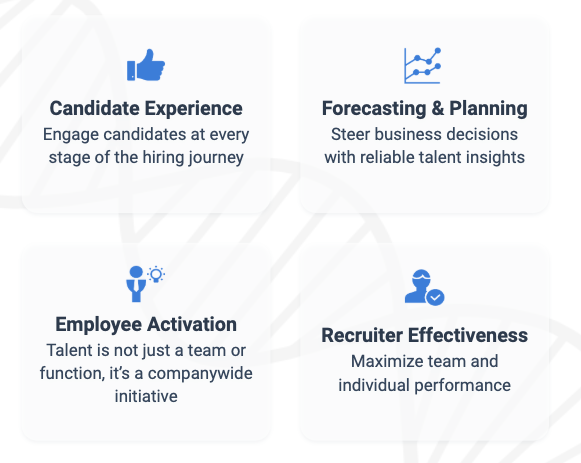The Rise of Talent Operations in the Modern Talent Team
Talent Operations is a function that we work with regularly, here at Beamery. We know that the Talent Operations or Recruiting Operations specialist is the person who usually helps the rest of the talent organization discover the full potential of any new tool or technology they bring in.
Why do talent teams need a Talent Operations specialist?
Operations are what makes or breaks a great strategy, and recruiting is no exception. First, consider all the work streams that are on the plate of your average recruiting team: they have to run recruiting events, executive search projects, employer branding campaigns, and manage their presence on various campuses, while at the same time keeping alums engaged, monitoring data privacy compliance issues, and making sure nurture campaigns are getting adequate engagement. And we haven't even touched on anything related to proactive sourcing.
When so many workflows are running in parallel, only a small operational detail needs to go wrong for things to start falling apart: A registration form can get fields switched up, a campaign’s variable can lose a bracket and send thousands of “Hi first name=there!” emails to your candidates … it doesn’t take much. That is one big reason why the team needs a Talent Operations specialist.
The other reason is that recruiting ops is where innovation, improvements, and efficient problem solving happens. With a full-time Recruiting Operations specialist on board, the team knows that someone is investigating the root cause of any arising issues, or testing out new workflows to improve the team’s efficiency.
Why a Talent Operations function makes a difference
Some of our most successful customers are teams who implemented Beamery as part of a larger reengineering of their Talent Acquisition strategy, or teams who used the implementation as a forcing function to reexamine their processes and workflow and redesign them.
The right individual to push for these strategic changes will have a specialized skill set, including data analysis, familiarity with technology assessment and implementation, and stakeholder management, in addition to familiarity with how a modern talent team works. They don’t just buy new tools, they design new ways of working and design the right solutions for them.
On top of that, a great Talent Operations specialist will not only be familiar with the inner workings of the talent team’s operations, they will also be trained in analytical problem solving tools that are found in Operations or Quality Assurance, for example, like such as root cause analysis, Ishikawa diagrams, or Six Sigma analysis to mention a few.
This means that they are able to dig deep into the root causes of any issues, and to suggest the best way to achieve new business results. They know all the data and metrics that flow in and out of the talent organization, and can piece it together to form insights and give answers the talent leaders.
Why think about Talent Operations now?
We live in a fluid talent market. Not only are jobs open for longer, but information about roles and employers is also more available, and candidates themselves are less constrained by geography or language.
CEOs are paying attention to their Talent Acquisition leaders, and asking them to step into a more forward-looking, more strategic role. It’s not enough anymore to fill requisitions and stay within budget; the Talent Acquisition organization needs to transform, and ensure that the company is able to attract, engage and retain the right talent now and in the foreseeable future.
There are four elements to this transformation:
- An operationally effective TA organization that delivers results at optimal level
- A thoughtful, consumer-grade candidate experience—now possible with modern talent technology
- Reliable talent insights that proactively push the business one direction or the other, as opposed to reacting only to its needs
- An approach to talent that is company-wide, and on the mind of every employee in some form or other

Companies are changing how they think about talent at the highest levels of leadership, and that includes giving their talent organizations the right operational backup to scale, improve efficiency, and become more forward-looking.
Hiring or training great Talent Operations specialists is only part of this trend, buy it will play a crucial role in helping companies become better at attracting, engaging, and retaining the talent they need to thrive.